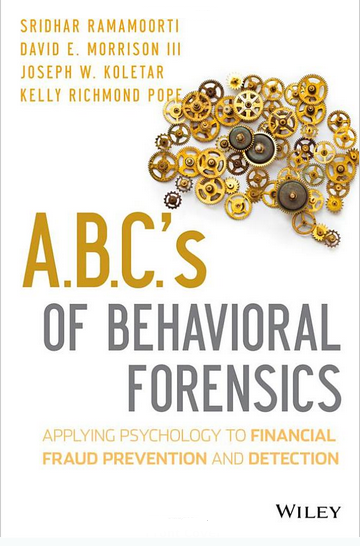Inaugural Education Program for the Behavioral Forensics Group
(Daven Morrison with Jack Bigelow, Vic Hartman and Joe Koletar) Last month we spent a weekend with the National Association of Certified Valuators and Analysts (NACVA) in San Diego. In our inaugural Behavioral Forensics Group seminar our team had the delightful opportunity to share our concepts and experience with seasoned fraud investigators. Invited by NACVA to provide education to their professionals who explore and track down concerns of fraud as they evaluate organizations.
The participants were curious about our shared experience in the human side of fraud and risk. They were not novices but rather seasoned veterans who were searching for new aspects of interviews, motivations and understanding. The participants were especially curious about our shared experience in the dimension of fraud that is often overlooked—the way in which the human mind works within fraudsters when they make that decision to commit white collar crime and justify it to themselves. Our impression was their appetites were satiated. The feedback was very positive and evidenced a need for even more training in this crucial area.
After an introduction facilitated by technology in which our founder Sridhar Ramamoorti was able to join the class by Skype from literally half way round the world, Jack Bigelow set the stage for the participants and for the presenters. His synthesized concepts and targeted quotes from the team and our text helped create an environment directed to learning, dialogue and to deeper thinking.
Joe Koletar then framed the fundamentals of fraud and the classic assumptions that reassure but misdirect auditors and financial minds. Bringing his experience as a former Chairman of the Board of Regents of ACFE, and his multiple decades with the FBI, Joe started the program off with a bang. Participants were intrigued with the questions he framed and the insights offered related to fraud prevention and where to look to find the evidence for financial crimes.
Not to be outdone, nor outgunned, Victor “Vic” Hartman, also of the FBI described the current fraud threat picture from a behavioral forensics perspective and with his knowledge as an attorney. He expanded on the concepts of the fraud triangle and fraud tree to provide strategic solutions for professionals advising those in charge of corporate governance. This was followed by session on interviewing basics for professionals including both legal and behavioral concepts.
Daven Morrison began the second day with a perspective on fraud that began and ended with the framework of an organizational psychiatrist. Exploring the role of emotions in the manipulations of the dark triad: narcissism, Machiavellianism and psychopathy participants were alarmed. Walking through a model of core motivations, a model which highlights the “reversal” of rule following and rule breaking the cases shared were explored in depth. Vic concluded this second day with an exercise on professional biases.
As the cases were explored in depth with the experts from the FBI and Jack Bigelow offering his perspective from the highest levels of Arthur Andersen with the students appreciated and shared the many light-bulbs of insights the dialogue revealed. Both current cases and older cases were examined and all had intriguing applications for the theory and the experience of the group.
The Behavioral Forensics Group is looking forward to presenting a two-day session in Las Vegas in June, 2018.
The Behavioral Forensics GroupTM LLC is a team of professionals with vast experience in detecting fraud, understanding why it occurs, and in recommending steps to mitigate fraud incidence within the corporate workplace, particularly within higher-level (and therefore more costly to the enterprise) executives. The fields of investigation, organizational psychiatry, accounting and behavioral forensics, and law enforcement are represented within the Behavioral Forensics GroupTM LLC. Acting in synergy to help organizations prevent, find, and/or reduce fraud, B4GTM is a premier, pioneering practice in this field.
We are blogging at: http://www.bringingfreudtofraud.com
